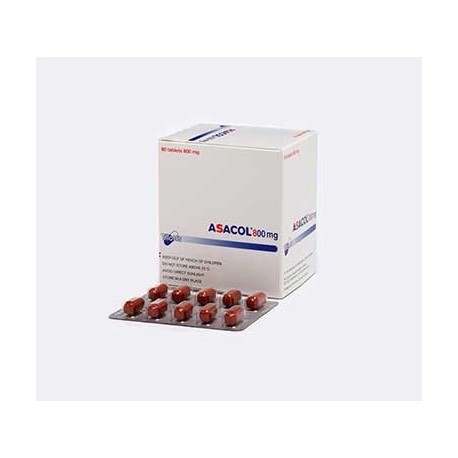 View larger
View larger Asacol (Mesalamine,Apriso,Canasa) 800 Mg 90 Tablets
ASC2556
New product
BUY MORE PAY LESS
| Quantity | Discount | |
|---|---|---|
| 2 | 5% | |
| 3 | 10% | |
| 4 | 15% | |
| 5 | 20% |
Volume discounts
| Quantity | Discount | You Save |
|---|---|---|
| 2 | 5% | Up to $7.90 |
| 3 | 10% | Up to $23.70 |
| 4 | 15% | Up to $47.40 |
| 5 | 20% | Up to $79.00 |
More info
ASACOL 800 mg gastro-resistant tablet is taken orally.
Active ingredient
Each gastro-resistant tablet contains 800 mg of mesalazine.
Excipients
Tablet core: Contains lactose monohydrate, sodium starch glycolate, magnesium stearate, talc, povidone.
Tablet coating: Methacrylic acid-methyl methacrylate copolymer, talc, triethyl citrate, yellow pigment hydrate, red pigment, macrogol 6000
1. What is ASACOL and what is it used for?
ASACOL are reddish-brown film-coated, oblong shaped tablets. It is available in blister packs of 90 film tablets.
ASACOL is in the group of drugs used against inflammatory bowel disease.
Ulcerative colitis is an inflammatory disease of the large intestine and the part of the intestine near the anus (rectum). ASACOL acts locally in ulcerative colitis and reduces the inflammatory state in the intestine. ASACOL can also prevent recurrence of ulcerative colitis.
Crohn's disease is a disease in which the walls of the small and large intestines become swollen and painful. ASACOL can prevent relapse of the disease by acting locally in Crohn's disease.
Ask your doctor if you have any questions about the mechanism of action of ASACOL or why this medicine has been prescribed for you.
2.How to use ASACOL?
Instructions for proper use and dose/frequency of administration
Unless otherwise stated by the physician, the following information is taken into consideration.
To improve ulcerative colitis, 3 tablets a day in divided doses as recommended by your doctor. If necessary, the dose can be increased up to 6 tablets.
To maintain the improvement in ulcerative colitis, 2-3 tablets per day at once or in divided doses as recommended by your doctor.
In Crohn's disease, 3 tablets a day in a single dose or in divided doses as recommended by your doctor.
If you are unsure of the dose of ASACOL administered to you or if you have any questions about the dose of the drug, consult your doctor.
Application route and method
ASACOL is for oral use only. Tablets should be swallowed whole with a glass of water, without breaking or chewing. Ideally, the tablets should be taken before meals.
different age groups
Use in children
Use in the elderly
To provide improvement; A daily dose of 30-50 mg/kg can be started in divided doses and increased to 75 mg/kg as needed. The total daily dose should not exceed 4 g.
To continue the improvement; A daily dose of 15-30 mg/kg can be administered in divided doses. The total daily dose should not exceed 2 g.
Generally, half the adult dose in children up to 40 kg; For children over 40 kg, the normal adult dose can be used.
Use in the elderly
In the elderly, as long as there is no severe renal impairment, the usual adult dose may be administered.
Special use cases
Kidney/liver failure: If you have severe kidney or liver failure, your doctor will decide on a dose appropriate for your situation. In this case, your kidney or liver functions should be closely monitored by your doctor at regular intervals.
If you have the impression that the effect of ASACOL is too strong or weak, talk to your doctor or pharmacist.
3. What are the possible side effects?
Like all medicines, there may be side effects in people who are sensitive to the substances contained in ASACOL.
If any of the following occur, stop using ASACOL and IMMEDIATELY inform your doctor or go to the nearest hospital emergency department:
If you see signs of allergies. Allergy symptoms include rash, itching, fever, difficult or wheezing, palpitations, chest pain, swelling of the face or throat, difficulty swallowing.
These are all very serious side effects.
If you have one of these, you have a serious allergy to ASACOL. You may need emergency medical attention or hospitalization.
All of these very serious side effects are very rare.
If you notice any of the following, tell your doctor immediately or go to the nearest hospital emergency department:
If you have fever, sore throat, mouth ulcers, spots under the skin, pallor, swelling of the joints, unexpected bleeding (such as gum or nose bleeding).
If you have a skin rash or scaling, mouth ulcers or sores.
Easy bruising or other blood abnormality is suspected.
If you have kidney function problems (decreased amount of urine).
All these are serious side effects. Emergency medical attention may be required. Serious side effects are very rare.
Tell your doctor if you notice any of the following:
If you have diarrhea, abdominal pain, vomiting, nausea, dizziness, headache, joint or muscle pain, indigestion.
If you have impaired heart, liver, lung or kidney function.
If you have liver, kidney or pancreatic inflammation.
If there is an abnormality in blood values.
If you feel dizzy or lightheaded.

